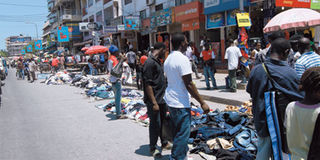Government starts setting aside areas for petty traders

Petty traders block the pavement along Uhuru Street in Dar es Salaam, forcing pedestrians onto the busy road. The government has started to move petty traders away from unauthorised areas in urban centres. PHOTO | CORRESPONDENT
Dar/Moro. The government has started allocating areas where petty traders, popularly known as machingas, will be conducting business.
The Minister of State in the President’s Office (Regional Administration and Local Government), Ms Ummy Mwalimu, said in Morogoro yesterday that in line with a recent directive issued by President Samia Suluhu Hassan, all district, municipal and city councils must immediately start allocating areas for machingas.
She was speaking during the distribution of partitions to machingas at the Kingalu main market.
The partitions, which will be used by over 800 petty traders, have been built at a cost of Sh81.7 million.
Ms Mwalimu directed all local councils to prepare and develop areas for traders so that they could conduct business without any hindrance.
Also present was the Minister for Industry and Trade, Prof Kitila Mkumbo, who urged council officials to be transparent and cooperate with petty traders to ensure that the distribution of partitions was conducted successfully.
He also called upon councils to ensure that those being offered partitions were the intended beneficiaries, and that rents should be maintained at affordable rates.
Speaking in Dodoma last week, President Hassan directed regional commissioners and district commissioners to set aside areas for petty traders.
“I want RCs to make arrangements that will neither hurt shop owners nor the hawkers,” the Head of State said after swearing in three newly appointed ministers and Attorney General.
“We have given them freedom to do business so that they can get their daily bread, but we have observed laxity to the extent that they are now everywhere, and are blocking other people’s shops,” said President Hassan.
She said as things stood, shop owners were now using machingas to operate their businesses so that they too, like the petty traders, could make money without paying tax.
“This denies the government revenue because machingas do not pay tax, but the shop owners are required to pay tax,” said the President.
She said hawkers must abide by the relevant laws and regulations
Machinga chairman Stephen Lusinde told The Citizen yesterday that they had begun registering hawkers in Dar es Salaam.
Through collaboration with Dar es Salaam City Council (DCC), they had so far registered 10,000 petty traders in Ilala, and will soon move to Ubungo Municipality.
“After the registration of traders in Ilala is completed, we will remove those operating along Nyerere Road and near bus rapid transit facilities,” he said.
According to Mr Lusinde after the registration process is finalised in Ilala, the next move would be to identify areas for hawkers.
He said discussions on where traders would be located so that they could operate profitably had already started with the city council director.
President Hassan said last week that the presence of informal businesses amidst traders who pay tax and rent had for many years been a major concern in the business community because it creates unfair competition.
“This is because formal traders pay tax while informal ones don’t,” she said.





